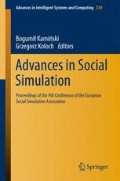Abstract
In the course of an increasing impetus to connect agent based simulations to empirical data, also the potentials of qualitative social science methods to inspire such models are explored. In this work, qualitative interviews, participating observation, and document analysis are combined to analyze a political process that relies heavily on the communication and the collaboration of stakeholders to serve as a text based data source for an agent based model of the process. The simulation outcomes are also produced in text format so that they are easily understandable to stakeholders and other users. The simulation reproduces the discussions among the stakeholders and their subsequent decisions, is able to react on changes in their general settings, and can be used to explore different sets of rules for the decision processes and their results.
Access this chapter
Tax calculation will be finalised at checkout
Purchases are for personal use only
Preview
Unable to display preview. Download preview PDF.
References
Amdam, R.: Empowerment Planning in Regional Development. European Planning Studies 18, 1805–1819 (2010)
Healey, P.: The Communicative Turn in Planning Theory and Its Implications for Spatial Strategy Formation. Environment and Planning B 23, 217–234 (1996)
Janssen, M.A., Ostrom, E.: Empirically-Based, Agent-Based Models. Ecology and the Society 11, 37 (2006)
Polhill, J.G., Sutherland, L.-A., Gotts, N.M.: Using Qualitative Evidence to Enhance an Agent-Based Modelling System for Studying Land Use Change. Journal of Artificial Societies and Social Simulation 13(2), 10 (2010)
Robinson, D.T., Brown, D.G., Parker, D.C., Schreinemachers, P., Janssen, M.A., Huigen, M., Wittmer, H., Gotts, N.M., Promburom, P., Irwin, E., Berger, T., Gatzweiler, F., Barnaud, C.: Comparison of empirical methods for building agent-based models in land use science. Journal of Land Use Science 2(1), 31–55 (2007)
Barreteau, O.: Our Companion Modelling Approach. Journal of Artificial Societies and Social Simulation 6(2), 1 (2003)
Guyot, P., Honiden, S.: Agent-Based Participatory Simulations: Merging Multi-Agent Systems and Role-Playing Games. Journal of Artificial Societies and Social Simulation 9(4), 8 (2006)
Gotts, N.M., Polhill, J.G.: Narrative Scenarios, Mediating Formalisms, and the Agent-Based Simulation of Land Use Change. In: Squazzoni, F. (ed.) EPOS 2006. LNCS, vol. 5466, pp. 99–116. Springer, Heidelberg (2009)
Hollander, C.D., Wu, A.S.: The Current State of Normative Agent-Based Systems. Journal of Artificial Societies and Social Simulation 14(2), 6 (2011)
Schenk, T.A.: Using stakeholders‘ narratives to build an agent based simulation of a political process. Simulation Transactions (submitted)
Ormerod, P., Rosewell, B.: Validation and Verification of Agent-Based Models in the Social Sciences. In: Squazzoni, F. (ed.) EPOS 2006. LNCS, vol. 5466, pp. 130–140. Springer, Heidelberg (2009)
Author information
Authors and Affiliations
Corresponding author
Editor information
Editors and Affiliations
Rights and permissions
Copyright information
© 2014 Springer-Verlag Berlin Heidelberg
About this paper
Cite this paper
Schenk, T.A. (2014). Generating an Agent Based Model from Interviews and Observations: Procedures and Challenges. In: Kamiński, B., Koloch, G. (eds) Advances in Social Simulation. Advances in Intelligent Systems and Computing, vol 229. Springer, Berlin, Heidelberg. https://doi.org/10.1007/978-3-642-39829-2_32
Download citation
DOI: https://doi.org/10.1007/978-3-642-39829-2_32
Publisher Name: Springer, Berlin, Heidelberg
Print ISBN: 978-3-642-39828-5
Online ISBN: 978-3-642-39829-2
eBook Packages: EngineeringEngineering (R0)

